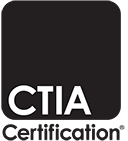PTCRB Certification
With PTCRB certification, operators and device manufacturers are confident of a device’s interoperability with wireless networks throughout the world.
Established in 1997 by leading wireless operators, PTCRB certification verifies compliance with global industry standards for mobile wireless devices. Member operators are committed to ensuring device quality through a rigorous certification process. Without PTCRB certification, manufacturers run the risk that their devices will perform poorly on wireless networks.
The Certification Process
Request
Manufacturer submits a request for certification through the PTCRB Certification database.
Select
Manufacturer selects a primary test lab to coordinate all the testing.
Determine Test Requirements
Primary test lab assesses device capabilities to determine testing required.
Test
Primary test lab manages testing and submits test results to the certification database.
Submit
Manufacturer submits required documentation to the certification database.
Pay
Manufacturer pays CTIA Certification fee and lab testing fees.
Confirm
CTIA Certification ensures that all requirements have been met.
Notify
Certification notice is issued to the manufacturer.
CTIA Certification Test Plans
Two test plans developed and maintained by CTIA Certification are among the many industry standards included in the PTCRB certification program.
Over-The-Air (OTA) Performance Testing
Network operators worldwide rely on the CTIA Certification Test Plan for Wireless Device Over-the-Air Performance to ensure devices operating on their networks meet defined performance expectations. It provides a comprehensive and accurate characterization of expected performance in SISO, MIMO, Wi-Fi, and GNSS environments. 3D patterns of transmit and receive performance are generated for the various frequency bands supported by a device.
Speech Performance Testing
The CTIA Certification Speech Performance Test Plan is another key component of PTCRB certification, ensuring the evaluation of speech performance in wireless devices. It establishes a standardized methodology for measuring the performance of speech-capable wireless devices in narrowband (NB), wideband (WB), and super wideband (SWB) modes. Test cases assess key performance factors, including loudness ratings, noise evaluation metrics, and the device’s effectiveness in eliminating echo and distortion.
PTCRB FAQs
Here are answers to common questions about our PTCRB Certification Program. If you have questions that we have not answered, please submit a question or contact us.
Devices eligible for PTCRB certification include smartphones, feature phones, tablets, notebook computers, modules, IoT chipsets, and devices incorporating certified chipsets.
PTCRB certification provides third-party assurance that certified devices meet a minimum set of requirements to ensure interoperability with wireless networks throughout the world.
Network operators and device manufacturers use the program to provide confidence that devices are compatible with global wireless networks and comply with the latest internationally-recognized standards.
Yes, the certification fees are:
- Phone, tablet, module, IoT chipset (initial certification) = $12,500
- Phone, tablet, module, IoT chipset (variant certification) = $3,125
- Notebook or tablet incorporating a certified module = $1,500
- Device incorporating a certified IoT chipset = $7,500
Please reference the Policies and Procedures for CTIA Certification Authorized Test Labs.
You can visit the PTCRB Certification website here.
Authorized PTCRB Certification Test Labs
There are numerous CTIA Certification Authorized Test Labs (ATLs) throughout the world. Find one near you.
Working Groups
CTIA Certification working groups are the foundation of our certification programs. This global network of operators, service providers, device manufacturers, test labs, and many others, solve industry challenges, enable new efficiencies, and hold the wireless industry to the highest standard.
